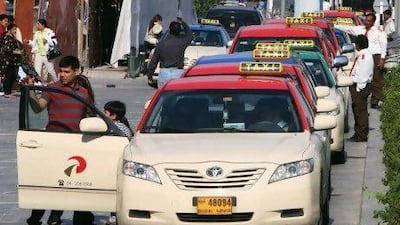Dubai Taxi Corporation (DTC) is considering adding a French or German model to its mix of motors, test driving Renault and Mercedes-Benz cars for its fleet.
The corporation, which runs about 50 per cent of the taxis in the emirate, recently bought more than 2,000 cars to replenish its fleet and will consider the two manufacturers in its next round of buying.
"We are open to trial. We invite a lot of companies," said Yousef Mohammed Al Ali, the director of fleet operations at DTC.
"Mercedes have sent a vehicle to try out as well as Renault. We have tried also the Corolla, the small Toyota car."
At present, DTC buys most of its cars from Toyota, purchasing 1,600 in the last round of tenders.
The DTC also bought 505 Nissan Altimas, after operating 100 Nissans for the past year two years.
"For any fleet, you should have at least three manufacturers to have a variety.
"Otherwise if you are stuck with one vehicle and if you have any problem, you have to face it," Mr Al Ali said.
For car manufacturers, selling cars to Dubai's taxi companies is a vote of confidence in their reliability. Dubai's taxis run for 24 hours straight, seven days a week, as their drivers work 12-hour shifts, with two drivers using one car per day.
The useful life of a taxi in Dubai is three years, with most cars clocking up more than 500,000km.
"The maintenance is the major thing," Mr Al Ali said. "Most of the agents fail in this … The support for the vehicle needs to be continuous."
Hyundai won an order for more than 800 cars at tender a year ago but lost out this year in the DTC's round of buying because its prices increased and maintenance costs for its vehicles were high in the past year. In deciding which cars to buy, the DTC, which is part of the Roads and Transport Authority, gives a 60 per cent weighting to considerations such as fuel consumption, maintenance costs, availability, the cost of spare parts and the quality of after-sale service.
The price of the car carries a 40 per cent weighting in the decision to buy or reject.
"Toyota, especially, try to reduce their costs as much as possible," Mr Al Ali said.
"They do a lot of modification to improve their cars. If we have a problem in the engine or the belt, they do some modification to extend the life of the taxi. Nissan are also working on it. They are improving." Most problems with the cars occur after 300,000km and in major components such as the transmission and engine.
The DTC has also included Volvos in its fleet, but these are now being phased out because of maintenance costs.
"The maintenance costs are the main factor, because they can kill the operation," Mr Al Ali said.
The Toyota Innova was the best in terms of maintenance costs, he said.
The DTC and four other major companies - National, Arabia, Cars and Metro - operate a total of more than 7,000 taxis in Dubai.

